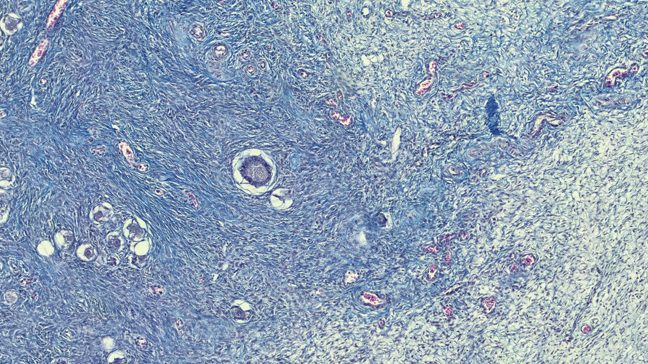request an appointment online.
- Diagnosis & Treatment
- Cancer Types
- Skin Cancer
Get details about our clinical trials that are currently enrolling patients.
View Clinical TrialsSkin cancer is the most common type of cancer in the United States. More than 2 million cases are diagnosed each year. About 20% of people in the United States will have skin cancer at least once by age 70.
Skin cancer is the most common type of cancer in the United States. More than 2 million cases are diagnosed each year. About 20% of people in the United States will have skin cancer at least once by age 70.
Skin cancer can affect people of all skin tones. It develops when the cells of your outermost layer of skin, called the epidermis, grow uncontrollably. The epidermis is primarily composed of three types of cells -- squamous cells, basal cells, and melanocytes. The type of cancer depends on the layer in which it starts.
The three most common types of skin cancer are:
Basal cell carcinoma: Basal cell carcinoma is the most common type of skin cancer. It originates in the basal layer of your epidermis, from which new skin skin cells grow. Basal cell skin cancers are slow growing and seldom spread, but they can invade and destroy underlying tissues and bone if left untreated. Read more about basal cell carcinoma.
Squamous cell carcinoma of the skin: Squamous cell carcinoma of the skin is the second most common type of skin cancer. It originates in your squamous cells, which make up most of your epidermis. It can grow more rapidly than basal cell carcinoma and is more likely to metastasize. It is also more likely to invade and destroy underlying bone and muscle if not treated. However, most cases are not life threatening. Read more about squamous cell carcinoma of the skin.
Melanoma: Melanoma is cancer that begins in the cells that produce skin pigment. It is less common than basal or squamous cell skin cancers, but it is more dangerous and can be deadly. If caught early, the five-year survival rate is nearly 100%. Read more about melanoma.
Additional, rare skin cancers include:
- Kaposi sarcoma, a rare skin cancer characterized by the presence of purple, red or brown lesions on the skin. It is caused by a virus and tends to affect people with suppressed immune systems.
- Merkel cell carcinoma, which appears as red, shiny nodules on the face, hands and neck. Learn more about Merkel cell carcinoma.
- Sebaceous gland carcinoma, a rare form of cancer that begins in the sweat or oil glands of your skin.
This page focuses on basal cell carcinoma and squamous cell carcinoma, which are sometimes referred to as non-melanoma skin cancer. When found early, most cases of non-melanoma skin cancers are curable.
Melanoma is more aggressive than non-melanoma skin cancers and is treated differently. More information on melanoma can be found on our melanoma disease page.
Skin cancer symptoms
In general, any new or changing spots on your skin that persist for two weeks or more should be brought to your doctor’s attention. Skin cancer often has no symptoms in its early stages, though symptoms can appear at any point.
Skin cancer symptoms may include:
- A new spot on the skin or
- A changes in the size, shape or color of an existing spot. These changes can vary greatly so there is no one way to describe how a skin cancer looks.
- A spot that is itchy or painful
- A non-healing sore that bleeds or develops a crust
- A red- or skin-colored shiny bump on the top of the skin
- A red rough or scaly spot that you can feel
- A growth with a raised border and central crust or bleeding
- A wart-like growth
- A scar-like growth without a well-defined border
Skin cancer symptoms can vary depending on the type of skin cancer and its location on the skin. Below are general descriptions of the various symptoms associated with specific skin cancer types.
Basal cell carcinoma symptoms
Basal cell carcinoma usually appears on the face, neck, arms, legs, ears and hands -- areas with high sun exposure. However, it can appear in other areas as well. Signs of basal cell carcinoma include:
- Pearly or waxy bump on the skin
- Flat, rough, or scar-like patch on the skin
- A sore that bleeds, doesn't fully heal, or that reoccurs
Visit our basal cell carcinoma page for more information.
Basal cell carcinoma pictures

This nodular basal cell carcinoma is ulcerated, or with an open sore. It has developed on the patient’s face, a common spot for these cancers to form.

asal cell carcinoma often develops on the head and neck area. This growth features a dome shape with a central depression and ulcer.

A nodular basal cell carcinoma on a patient’s back. This growth shows three classic elements of a nodular basal cell carcinoma: a pearly center, a “ro

A pigmented basal cell carcinoma. The shiny areas, speckled pigment and asymmetrical shape are features of this subtype.

A nodular basal cell carcinoma. This ulcerated growth looks like a cut, but it will not heal on its own.
Squamous cell carcinoma
Squamous cell carcinoma also tends to develop in areas of high sun exposure. In some cases, squamous cell carcinoma can affect areas that are not exposed to sunlight. This is especially the case for people with darker skin tones. Signs of squamous cell carcinoma include:
- A firm, red nodule
- A scaly or crusty lesion with irregular borders
- Painful or itchy skin lesion
Visit our squamous cell carcinoma page for more information.
Melanoma symptoms
Melanoma of the skin can occur anywhere on the body and may develop out of existing moles. In people with darker skin tones, melanoma tends to occur on the palms or soles of the feet. Signs of melanoma include:
- Change in the appearance of a mole
- Development of a large brown spot, often with irregular edges
Visit our melanoma page for more information.
Skin cancer risk factors
Anything that increases your odds of developing skin cancer is a risk factor.
Skin cancer risk factors include:
- Ultraviolet light (UV radiation): Extensive lifetime sun exposure or occasional intense exposure, especially without sunscreen
- Living at a high altitude or in a sunny climate
- A history of sunburns
- Tanning bed use
- Age: Sun exposure increases with age, and older patients tend to be at higher risk
- Having a fair complexion, blond or red hair, freckles, blue eyes and/or a tendency to sunburn.
- Being immunocompromised, typically due to taking immunosuppressive drugs.
- Family history of skin cancer
- Having many moles, especially abnormal moles that are large or have an irregular shape (dysplastic nevi)
- A personal history of skin cancer: Having skin cancer once puts you at higher risk for developing skin cancer again
- Certain rare genetic disorders, including xeroderma pigmentosum and basal cell nevus syndrome.
- Previous serious skin injuries, such as a major scar or burn.
- Actinic (solar) keratosis. This is a precancerous lesion that may appear as rough, red and scaly patches on the skin. It may be tender and is often more easily felt than seen. Like skin cancer, actinic keratosis usually is found on sun-exposed areas of the body. About 5% develop into a non-melanoma skin cancer.
Not everyone with risk factors gets skin cancer. However, if you have risk factors, it’s a good idea to discuss them with your health care provider.
Learn more about skin cancer:
Some people have an elevated risk of developing skin cancer. Review the skin cancer screening guidelines to see if you need to be tested.
Behavioral and lifestyle changes can help prevent skin cancer. Visit our prevention and screening section to learn how to manage your risk.
In rare cases, skin cancer can be passed down from one generation to the next. Genetic counseling may be right for you. Visit our genetic testing page to learn more.


Featured Podcast:
How cancer survivors can stay healthy in summer
Radiation oncologist Pamela Schlembach, M.D., and dermatologist Hung Doan, M.D., Ph.D., share hydration and sunscreen tips to help people undergoing cancer treatment stay healthy.
MD Anderson is #1 in Cancer Care

What should you look for in a sun hat?
Dermatologists most often find basal and squamous cell skin cancers on the head and neck. That includes the face, neck, scalp and ears. So, all of those areas need to be protected equally from the sun’s harmful ultraviolet rays.
But what should you look for when choosing a hat specifically for sun protection? How wide should the brim be? And, are some fabrics or materials better than others?
Here’s what I tell the patients who seek my advice.
Choose a hat with a brim at least 2”-3” wide
No standard definition exists as to what constitutes a “wide” brim. But, generally speaking, it should:
- extend at least 2 to 3 inches away from your head and
- stretch all the way around the crown of the hat.
Sun visors don’t do any good. They might cut down on glare a bit because they shade your eyes, but they still leave the top of your head, ears and back of your neck exposed — and vulnerable to sunburn.
Baseball caps are not ideal either. They only protect a portion of your face. If you absolutely must wear a baseball cap, though, be sure to wear sunglasses, too, and use sunscreen to cover your neck, ears, face and any other exposed skin. Many of these products can be used together to give you the greatest protection.
Pick a hat that you can’t see through
A hat will not provide enough sun protection if you can hold it up to a bright light source and still see its rays shining through. The same is true of clothing.
Straw hats especially tend to have large gaps in the weave. And while that might make them cooler or more comfortable to wear, they’re not very protective. So, avoid hats with holes in them.
Instead, look for materials with a tight weave and a UPF rating. UPF 50+ is considered the gold standard, but anything in the UPF 30-49 range is still considered good.
Stay cool with vents or lighter colors
One reason people give for not wearing UPF clothing — and hats in general — is that they can be hot. That is especially true here in Texas. Unfortunately, tightly woven fabrics are not known for being breathable.
One thing that can help is to play around a bit with color. Hats in dark or very bright colors, for instance, tend to absorb light rays, making them feel hotter. But hats in lighter colors — especially if they’re shiny or metallic — reflect these rays away from you. So, if you can find a light-colored hat with a UPF 50+ rating, you can maximize both your sun protection and your comfort level.
Some sun hats are made with built-in vents that allow heat to escape, too. But if there’s any doubt that a hat will protect you, go with another option. Ideally, you want to choose something lightweight, with a UPF rating, that completely blocks the sun and protects your ears, face and neck.
Other features to consider
Some hats are crushable for easy packing or have a wire around the brim so you can play with their shape. Others have chin straps to keep them securely attached to your head under windy conditions. None of these features is strictly necessary from a protection standpoint, but they can still be useful. So, select those features based on your personal preferences.
Personally, I find a lot of my most functional hats at sporting goods stores. Those retailers cater specifically to people who are heavily engaged in outdoor activities, so they tend to give you the most bang for your buck. You can normally find a wide selection of hats there made from lightweight, breathable materials that are meant for outdoor use and will look good.
Shop for MD Anderson-branded UPF gear.
Request an appointment at MD Anderson online or call 1-877-632-6789.

10 sunscreen myths debunked
Sunscreen is a hot topic – and not just because it’s a summertime staple!
There are also many myths and misconceptions surrounding sunscreen’s safety, effectiveness and usefulness.
So, if you’ve ever been confused about when – or if – to use sunscreen, you’re not alone.
We asked dermatologist Anisha Patel, M.D., about common sunscreen myths. Read on for her answers.
Myth 1: All sunscreens work the same way.
False. Sunscreens can prevent sunburn in different ways.
Chemical sunscreens: The active ingredients in chemical sunscreens absorb UV rays as they hit the skin, Patel explains.
Physical blocker sunscreens: Physical sunscreens, which are also called mineral sunscreens or sun blocks, use ingredients such as zinc oxide and titanium dioxide to form a barrier on the skin’s surface that reflects UV rays.
Not sure whether to use a chemical or physical sunscreen? Hybrid sunscreens contain both chemical absorbers and physical blockers.
When selecting a sunscreen, MD Anderson dermatologists recommend choosing a broad-spectrum product with at least sun protection factor (SPF) 30. 'Broad spectrum' means the product protects from both UVA and UVB rays which can lead to sun damage and skin cancer. SPF refers to the amount of UVB rays it blocks.
Myth 2: It doesn’t matter what kind of sunscreen I choose.
False. While wearing sunscreen is always a good choice, each type of sunscreen has instructions that must be followed to ensure your skin is protected.
Sunscreen comes in forms including cream, lotion, spray, powder and stick.
Each type of sunscreen has benefits and limitations. For example, many spray sunscreens are clear and absorb into the skin quickly, but this can make it challenging to see if you’ve missed a spot.
Overwhelmed by options? MD Anderson dermatologists recommend physical blocker sunscreens. Patel says this is because they have the broadest range of UVA and UVB protection.
Whatever type of sunscreen you choose, always review its instructions for information on how – and how frequently – to apply and reapply.
Myth 3: Sunscreen causes cancer.
False. There is no medical evidence that sunscreen causes cancer. However, there is a lot of evidence that UV rays from the sun and tanning beds do.
In the past, some sunscreens were recalled for being contaminated with a chemical called benzene. Benzene is not normally found in sunscreen. This recall doesn’t mean you should stop wearing sunscreen, dermatologists say.
Still, some may feel more comfortable using sunscreens that don't absorb into the skin – that is, those physical blockers sunscreens described above.
Additionally, sunscreen isn’t the only way you can practice sun safety.
“There are a lot of sun protective options outside of just the creams and sprays,” Patel says.
Other ways to protect yourself from sun damage include:
- Wearing protective clothing that is dark and tightly woven, with ultraviolet protection factor (UPF) 50+
- Wearing a wide-brimmed hat
- Wearing sunglasses with UVA and UVB protection
- Seeking shade between 10 a.m. and 4 p.m. when sun rays are strongest
Myth 4: I have dark skin. I don’t need to wear sunscreen.
False. Dark skin is susceptible to sun damage.
It takes more sun exposure for darker skin types to get sun damage, Patel says. She explains this is because melanin, which gives skin its color, provides DNA with a small amount of sun protection. Still, this small amount of protection doesn’t prevent sun damage altogether.
“Darker skinned people can still get a sunburn, still get skin cancers and definitely still get photoaging from UV exposure,” Patel says.
Regardless of your skin color, apply sunscreen liberally 30 minutes before going out in the sun, and don’t forget to reapply every two hours or after swimming or sweating.
Myth 5: My sunscreen is waterproof, so I don’t need to reapply it after swimming or sweating.
False. According to the Food and Drug Administration (FDA), there is no such thing as waterproof sunscreen.
There is, however, water-resistant sunscreen. Check the product label to see how long it works for. Water-resistant products must say whether they are “effective for 40 minutes or 80 minutes when swimming or sweating,” writes the FDA.
Heading for a beach day or outdoor workout? Choose a water-resistant sunscreen and follow the product instructions on how often to reapply.
Myth 6: My sunscreen is SPF 50, so I don’t need to apply it as often.
False. No matter the SPF number, chemical absorber sunscreens only work for about two hours and should be reapplied after swimming or sweating.
Regardless of the SPF level you choose, you need to reapply with the same frequency, Patel says.
If you have trouble remembering to reapply, Patel suggests using a physical blocker sunscreen. These products don’t rub in or disappear into the skin, so it is easy to determine when to reapply.
“If you can see the white on your face, it's still working,” she says.
Myth 7: There is SPF in my makeup. I don’t need to wear sunscreen.
False. While Patel says that sunscreen in makeup counts, it usually doesn’t provide the recommended SPF levels.
“It's typically only 5 to 15 SPF, and we recommend 30,” she says.
Check that your makeup offers at least 30 SPF, and use additional sunscreen as needed. Finally, don’t forget to apply sunscreen to other exposed areas of your body, and make sure you reapply sunscreen as directed throughout the day.
Myth 8: I only need sunscreen in the summer or if it's sunny.
False. Sunburn and sun damage may be associated with hot, sunny weather, but they can also occur in cold, cloudy conditions.
“Even when it's cold, sun is getting through the clouds,” Patel says.
While clouds filter some UVB rays, they don’t block UVA rays, which are a risk factor for melanoma, she adds.
Likewise, UV rays don’t disappear in the winter. In fact, snowy winter activities can even increase your risk of sunburn.
“Snow sports can be sneaky because you get the reflection off the snow as well as overhead exposure,” Patel says.
Be especially cautious of sunburn at high altitudes, such as when you are skiing. At high altitudes, UV rays are less filtered by the atmosphere, which leads to more intense UV exposure, she adds.
So, sunny or cloudy, hot or cold, summer or winter, apply sunscreen to any exposed skin just like you would if it were a warm, sunny day.
Myth 9: I don’t need sunscreen inside.
False. Spending time indoors shouldn't mean skipping SPF. That’s because UV rays can come through windows.
“Most windows, unless they are tempered glass or have a UV-filtering film, allow passage of UV rays,” Patel says.
Likewise, she notes that wearing SPF – even on days you’re mostly inside – protects your skin from UV exposure you might not even recognize you’re getting, like while driving or walking through the parking lot to the grocery store.
“Most people would say they were inside all day, but there is cumulative incidental exposure that occurs,” she says.
Myth 10: Sunscreen doesn’t expire.
False. “You cannot rely on expired sunscreen,” Patel says. “Nothing bad is going to happen if you use an expired one in terms of increased toxicity. It just won't work.”
It is also important to store sunscreen properly. Specific storage instructions can be found in the product’s ‘Drug Facts’ section.
For example, if you store your sunscreen in a hot car or in direct sunlight, Patel says the product could degrade earlier than its expiration date.
“You have to look at the storage recommendations. Sunscreen will only last until the expiration date if you keep it within those temperature ranges,” she says. “If you go outside of those temperature ranges, the molecules that are protecting your skin will degrade faster.”
Request an appointment at MD Anderson online or call 1-877-632-6789.

How does sunscreen work? Understanding UV protection
The sun’s ultraviolet radiation damages skin cells, which can lead to sunburn, early aging and even skin cancer. Thankfully, sunscreen can protect your skin.
But choosing a sunscreen isn’t as easy as it might seem. Sunscreens work in different ways and come in a variety of formats. And, beyond that, some people have concerns about sunscreen’s safety, necessity and usefulness.
For help navigating the sometimes cloudy world of sunscreen, we spoke to Saira George, M.D., a dermatologist at MD Anderson in Sugar Land.
How does sunscreen work?
Sunscreen ingredients prevent UV rays from damaging your skin. There are two categories of sunscreen ingredients, George says.
Physical blockers
Physical blockers contain minerals such as titanium dioxide or zinc oxide ground into fine particles. These minerals sit on the surface of the skin and reflect UV rays away from your skin “a lot like a shield or mirror would,” George says. Sunscreen products that contain physical blockers are sometimes called sunblock or mineral sunscreens.
Chemical absorbers
Chemical sunscreen ingredients form a thin protective film that absorbs UV radiation before it penetrates the skin. Sunscreen products that contain chemical absorbers are sometimes called organic sunscreens.
Both types of sunscreen ingredients have pros and cons.
For example, physical blocker sunscreens generally do not cause irritation, stinging or allergic reactions, but they can be white and greasy. Meanwhile, chemical absorber sunscreen ingredients are usually clear and easy to apply, but these are more likely to cause irritation and allergic reactions.
Many sunscreens use a combination of physical blockers and chemical absorbers to maximize the benefits and reduce the downsides. Additionally, many broad-spectrum sunscreens need a combination of ingredients to protect against UVA and UVB rays, the two types of ultraviolet rays that cause skin damage.
Which form of sunscreen is best?
Sunscreens also come in forms such as lotions, sprays and powders. But which one is right for you?
George typically recommends lotion and cream products.
“In general, I tend to steer people away from spray and powder sunscreens because it is harder to get effective coverage with them,” George says. “I also worry about the risks of the sunscreen product inadvertently getting into an area like your eyes or being inhaled.”
Whatever sunscreen format you choose, look for an option that:
- Provides sun protection factor SPF 30 or higher
- Has broad-spectrum protection against both UVA and UVB rays
- Is water-resistant
Make sure you apply sunscreen liberally and reapply it every two hours or after swimming or sweating. Be sure to review your sunscreen’s instructions for specific information on how much product to use and how often to reapply.
George recommends trying different products until you find one you can apply correctly and don’t mind wearing.
“There are so many different options for sunscreens now; there’s one out there for everyone,” she says. “The best sunscreen is the one you’ll wear regularly.”
Is sunscreen safe?
When it comes to sunscreen, the benefits outweigh any potential risk.
UV damage plays a central role in the development of most melanomas, basal cell cancer, squamous cell cancers and other less common skin cancers, George says.
Studies show that sunscreen can help prevent skin damage caused by UV radiation. Regardless, George says many patients still ask about the necessity or safety of sunscreen.
“I understand the concern. What’s more natural than sunlight? But we have to understand that there are carcinogens in nature, and too much UV radiation from the sun is an example of that,” she says. “Our bodies have amazing protective mechanisms in place to handle sun damage, but they haven’t evolved to overcome damage from the excessive sun exposure many of us rack up in our lifetime.”
Studies show that the chemical and nonchemical sunscreens available today all appear to be safe.
“We have lots of evidence to support sunscreen’s protective effects and very little that shows any dangers or risks from sunscreen’s use, but I can sympathize with concerns about chemicals in everyday products,” George says.
If you are worried about sunscreen safety, George recommends choosing a simple mineral sunscreen which protects the skin by using physical blocker ingredients.
When do we need to wear sunscreen?
Sunscreen is often associated with hot, sunny summer days. But MD Anderson experts recommend wearing sunscreen and using other sun protection methods year-round.
“Peak UV intensity does tend to be much higher during the summer or on a bright cloudless summer day,” George says. “But as long as the sun is out, we are still getting exposed to some degree of ultraviolet radiation – including on cloudy or winter days.”
She notes that altitude and reflective surfaces like snow and water can increase UV exposure. This means that it is important to apply sunscreen before activities like skiing or spending time by or in the pool.
How else can I protect my skin from sun damage?
Sunscreen is just one part of what George calls a “sun protection package.”
Ideally, your sun protection package will include multiple ways to protect your skin from the sun.
Other ways to protect your skin from sun damage include:
- Staying out of the sun during the peak UV hours of 10 a.m. to 4 p.m.
- Wearing protective clothing. Choose items that are dark and have a tight knit or ultraviolet protection factor (UPF) 50+.
- Wearing a wide-brimmed hat
- Wearing sunglasses with UVA and UVB protection
“My biggest advice about sunscreens is to remember they are specifically named “screens,” not “blocks” and should be used as part of a full sun protection package,” George says. “When you are trying to protect your skin, sunscreens are certainly helpful, but they aren’t a perfect shield.”
Request an appointment at MD Anderson online or call 1-877-632-6789.

What happens when you get a sunburn
Sunburn causes skin sensations that many of us are all too familiar with: stinging, burning, blistering, peeling, and, of course, that hallmark redness.
But why does sunburn happen? And are there any health risks that last after a sunburn has faded?
Dermatologist Saira George, M.D., answers these questions and shares how to prevent and treat a sunburn.
How your skin changes during a sunburn
Often, burns are associated with heat sources like flames or stoves. But did you know that it’s not actually the sun’s heat that causes sunburn?
Instead, George explains that ultraviolet radiation is responsible for sunburn.
“Sunburns are from ultraviolet radiation – or UV rays – causing damage to the skin,” she says.
When ultraviolet radiation from the sun reaches the skin, it damages the skin cells and causes mutations in their DNA.
“Our bodies have a lot of amazing mechanisms to prevent and even correct these mutations,” George says. “But if the skin cells get more UV exposure than they can handle, the damage may be beyond repair, and the cells die off. Blood vessels dilate to increase blood flow and bring immune cells to the skin to help clean up the mess. All this causes the redness, swelling and inflammation we associate with a sunburn.”
The sunburn will eventually heal, but some of the surviving cells will have mutations that escape repair. These cells could eventually become cancerous.
Cancers caused by sun damage
UV damage plays a central role in the development of the three most common skin cancers, George says.
These include:
She also notes that UV damage is linked to less common skin cancers, including:
- Merkel cell carcinoma
- Angiosarcoma
- Atypical fibroxanthoma
Tell your doctor about sun-related skin changes
After you get a sunburn, make note of any changes to your skin. Your doctor or dermatologist can examine these changes and recommend skin cancer screening, if needed.
“Anything that deviates from your normal skin that happens when you are in the sun or develops in an area that has received a lot of sun may be worth mentioning,” George says.
Tell your doctor about sun-related skin conditions such as:
- Rashes that develop in the sun
- Unusual growths in areas that have been sunburned or get a lot of sun
- New or growing spots that heal slowly, bleed or don’t look or behave like other spots on the skin
How to treat a sunburn
Sometimes, despite our best efforts, sunburns happen.
While it isn’t possible to reverse sun damage, there are ways you can protect and soothe your skin while it heals, George says.
Protect your skin
First, use sun protection to prevent additional sun damage to your skin as it heals.
Additionally, avoid exposing your sunburn to heat, harsh chemicals or friction.
Soothe your skin
Sunburn can be painful. To ease discomfort, George suggests applying cool compresses, calamine lotion or aloe-vera gel to the sunburned area.
If your skin is peeling or blistered, George recommends coating it with ointments like Vaseline, which she says can act like an “ointment bandage.”
Still not feeling relief? Over-the-counter anti-inflammatory pain medications like ibuprofen can reduce pain and inflammation.
What to know about reversing sun damage
Sun damage can also cause cosmetic changes such as sunspots, wrinkles and redness, George says.
Some beauty products claim they can reverse sun damage or even stimulate cell repair. But no research has shown that any topical skin care product or lotion can reverse sun damage.
“There’s no simple way to undo sun damage yet. But there are lots of simple ways to prevent it by being sun-safe and avoiding sunburns,” George says.
However, while skin damage can’t be undone on a cellular level, there are procedures that can make it less noticeable.
“A lot of cosmetic concerns can also be addressed with your cosmetic provider if they are bothersome to you,” she notes.
How to prevent sunburn going forward
One of the best ways you can protect your skin? By preventing sunburns in the future!
Follow these sun safety tips to protect your skin from the sun and lower your cancer risk.
- Choose a sunscreen that has an SPF of 30 or higher, is water-resistant and offers broad-spectrum protection.
- Apply sunscreen at least 30 minutes before going in the sun.
- Reapply sunscreen every two hours, and after swimming or sweating.
- Seek shade when possible, especially when the sun’s UV rays are strongest between 10 a.m. and 4 p.m.
- Cover up with wide-brimmed hats, sunglasses with protection from UVA and UVB rays and UV-protective clothing.
“Preventing a sunburn is always better than treating one,” George says.
Request an appointment at MD Anderson online or call 1-877-632-6789.

5 things to know about raised moles
When people talk about moles, they are usually referring to a variety of skin growths, including true moles — which are also called nevi — freckles and other growths. However, in dermatology, a mole is a very specific type of skin growth that looks a certain way under a microscope.
Ahead, I’ll share more facts you might not know about moles, including how to tell if they are healthy.
Raised or flat doesn’t mean healthy or unhealthy
We can’t rely solely on whether a mole is raised or flat to determine if it is healthy. Some moles and skin lesions naturally grow vertically rather than horizontally. Moles that grow up and down are going to feel more raised than moles that grow laterally.
Instead of whether a mole is raised or not, start with the ABCDE rule to help determine if your mole may be healthy or may be exhibiting signs of melanoma, a type of very high-risk skin cancer.
A is for asymmetry, or whether one half of the mole looks different from the other half.
B is for border. You can tell if your mole has an unusual border if it would be challenging to outline.
C is for color. Note if your mole is multiple colors.
D is for diameter. Is your mole larger than the size of a pencil eraser, or about 6 millimeters?
E is for evolving. Has your mole rapidly grown or begun to hurt, itch or bleed? If something is bleeding or painful, those are my signs that it should prompt attention.
You can also use the Ugly Duckling rule to determine if a mole may be abnormal. Ugly Duckling moles look different than your other spots. This could look like developing a black mole when all of the other moles on your body are brown.
If your mole meets any of the ABCDE criteria or follows the Ugly Duckling rule, make an appointment with a dermatologist for a skin cancer screening exam.
Having a high number of moles may increase your skin cancer risk
Having more moles — especially 50 or more — can increase your risk for melanoma.
If you have more than 50 moles, you are considered to have a higher risk for skin cancer and could benefit from an annual skin check with a dermatologist.
It is rarer to develop moles after age 40
Usually, after around age 40, people stop developing new moles. You can certainly develop other skin lesions after this age, though! Don’t be afraid to see a dermatologist about any type of new or rapidly changing spot on your skin, or a spot that bleeds, hurts or itches.
It’s possible to remove raised moles, but not always recommended
While it is possible to remove raised moles, many dermatologists prefer not to remove healthy-looking moles unless they bother or worry the patient. That’s because removing a mole can leave a scar. Moles can also grow back after they are removed, which can look atypical.
I also warn patients against getting moles removed by providers who aren’t dermatologists. While it isn’t common, it is possible to get a skin lesion partially removed that turns out to be cancerous. This can complicate and delay a skin cancer diagnosis.
If you have a mole that bothers or concerns you, talk to your dermatologist about the best way to proceed.
When in doubt, see a dermatologist
Check your skin every month. It can be hard to notice skin changes on a daily or weekly basis, but monthly check-ins allow you to note if a mole or other spot on your skin is dramatically changing.
If you wonder if a skin spot requires a trip to the dermatologist, I always recommend making an appointment. It can be hard to figure out what skin spots are normal on your own, not to mention challenging to check your own scalp or back.
At a skin screening, a dermatologist will look at your skin, sometimes with the help of a magnifying tool called a dermatascope. They may ask you questions about the history of the spot, how long it has been there and the changes that prompted your visit.
If your dermatologist sees any concerning spots, they may perform a biopsy. This involves removing a mole and looking at it underneath a microscope to diagnose if it is cancerous.
Another benefit of making an appointment with a dermatologist for a full body skin assessment? Your dermatologist can keep an eye on any skin changes that happen over time. In this case, preventive care is as simple as taking a look at your skin.
Request an appointment at MD Anderson online or call 1-877-632-6789.

Need a punch biopsy? Here’s what to expect
As a dermatologist, I examine skin all day, every day. If I see something concerning on your skin, I may perform a punch biopsy to learn more about it. A punch biopsy is a minimally invasive procedure that takes a sample of your skin to check for signs of disease.
Here, I’ll answer common questions about punch biopsies.
What does a punch biopsy test for?
Typically, we’ll do a punch biopsy if we see a rash or something suspicious on your skin, or if we suspect you may have cancer.
We give a sample of your skin to a pathologist to look at under a microscope. This can help us diagnose skin cancer or other skin conditions like moles, inflammatory skin conditions or precancerous lesions. It can also help us rule out cancer.
Why is it called a punch biopsy?
A punch biopsy is described by the tool that is used to retrieve the skin sample.
Your doctor will use a sharp, circular (punch) tool to cut deep into the tissue and then use scissors to remove a small core of skin.
What happens during a punch biopsy?
A punch biopsy is an outpatient procedure. This means it is done in a clinic or doctor’s office, and you can go home afterward.
You will be awake during the procedure. First, a nurse or doctor will inject a numbing agent like lidocaine into the skin where the biopsy will be performed. You might feel some slight discomfort when the needle is injected into your skin. After that, you should not feel any pain.
Your doctor will then use the punch tool to cut into your tissue and retrieve the skin sample. The actual sample is very small. A standard punch biopsy size ranges from about 2 to 8 millimeters.
You may get 1 or 2 stitches, depending on the size of the biopsy. Then, we’ll clean the area with an alcohol swab, apply an antibiotic ointment and cover the area with a bandage.
The entire procedure takes about 15 minutes.
How long does it take for a punch biopsy to heal?
You will need to keep the area dry for 24 hours after your punch biopsy. After that, you can begin washing the area with regular soap and water. We tell patients to apply petroleum jelly and a bandage to the area until the stitches are removed. We remove the stitches 10 to 14 days after the biopsy, depending on the location of the biopsy. After that, you can treat the area like normal.
There will be a scar any time you cut the skin. So, the biopsy will leave a scar that is the same size as the punch. In most cases, we perform 4-millimeter punch biopsies, which are very small.
When will you get the results from a punch biopsy?
Your biopsy sample will be reviewed by a pathologist, and the results will be given to your doctor. Your doctor will then share the results with you. This usually takes about a week.
It’s important to note that a punch biopsy is a technique for sampling the skin to look for disease or skin conditions. It is not meant to be a definitive treatment. Your doctor will go over the results with you and discuss the next steps, whether that’s treatment, surveillance or something else.
I always stress to patients that a punch biopsy is a minimally invasive procedure that we do often. It is not painful. And it usually takes longer for you to read over and sign the consent forms than it does for us to do the actual biopsy. So, you don’t have to be nervous about it.
Anisha Patel, M.D., is a dermatologist at MD Anderson.
Request an appointment at MD Anderson online or call 1-877-632-6789.

What SPF should I use?
Sunscreen helps protect your skin from ultraviolet (UV) radiation. But which SPF is best?
MD Anderson dermatologists recommend sunscreen that is at least SPF 30, broad-spectrum and water resistant. Even with those guidelines, there are plenty of options to choose from. They may even prompt questions like, “If SPF 30 is good, does that mean SPF 50 or even SPF 100 is better?”
I always like to remind patients that sunscreen – no matter what SPF you choose – is only one part of sun protection. Ahead, we’ll talk about SPF and how to use it as part of a larger sun safety routine.
How is SPF determined?
SPF levels are determined by laboratory testing. Sunscreen is applied to a designated patch of skin before it’s exposed to an ultraviolet light source that simulates sun exposure. Then, the time it takes the sunscreen-protected skin to redden or burn is carefully measured and compared with the time it takes a similar area of unprotected skin to redden or burn. The testing protocol specifies everything from the amount of sunscreen applied per area of skin to the type of light source that is used. This is done to standardize measurements and make it easier for shoppers to compare sunscreens using their SPF levels.
In laboratory SPF testing, small areas of skin are covered in a uniform, thick layer of sunscreen. But real-life conditions — like a day at the beach or an afternoon spent by the pool — are not controlled like they are in the laboratory. People tend to underapply sunscreen, apply it unevenly and forget to reapply it before it wears off or gets rubbed off. Likewise, conditions like the intensity of UV exposure can change. This means most of us won’t reach the sunscreen’s level of SPF in everyday use.
How much protection does SPF provide?
Sunscreens help protect our skin by reflecting or absorbing the ultraviolet rays that cause sunburn and skin damage. SPF numbers give us an idea of how much protection a sunscreen provides and how it compares to other sunscreens. A higher SPF means a sunscreen can absorb or reflect more sunburn-causing UVB rays to prevent you from getting burned than a lower SPF sunscreen can.
Double the SPF number doesn’t mean double the protection, however. This is because the amount of UVB blocked by sunscreen is not linear. In other words, after a certain point, a higher SPF number may only provide a little more UVB protection.
For example,
- SPF 15 blocks 93% of UVB rays
- SPF 30 blocks 97% of UVB rays
- SPF 50 blocks 98% of UVB rays
Likewise, after a certain point, less extra UV exposure is needed to cause more damage to your skin.
Think of it like layering clothes in a blizzard. The first few layers make a huge difference in blocking the cold. After that, the third and fourth layers provide additional protection, but proportionally less than the first layers did.
What do these sunscreen terms mean?
Sometimes it can seem like you need a dictionary to read sunscreen packaging. Here’s what some common sunscreen terms mean.
Broad-spectrum
MD Anderson dermatologists recommend choosing a broad-spectrum sunscreen. This means that the sunscreen protects from two different types of sun rays that can damage skin: UVA and UVB.
UVA exposure leads to skin tanning, pigmentation and oxidative damage that can contribute to photoaging and add to the cancer-causing effects of UVB.
UVB exposure is the main cause of sunburn and can lead to skin cancers, including melanoma, basal cell carcinoma and squamous cell carcinoma of the skin.
Water-resistant
If you are swimming, sweating or splashing, MD Anderson dermatologists recommend choosing a water-resistant sunscreen. The Food and Drug Administration (FDA) regulates sunscreen products and writes that water-resistant products are labeled as providing their SPF levels for either 40 or 80 minutes, even in wet conditions.
Don't forget: You still need to reapply water-resistant sunscreen just as frequently as sunscreen that isn’t water-resistant.
PA++++
Sunscreens labeled as ‘broad-spectrum’ have been tested to protect against UVA and UVB rays. The PA++++ index is a newer, separate rating that means additional testing was done to quantify how much UVA protection a sunscreen provides. It is based on a number called the UVA-Protection Factor (UVA-PF), which is like SPF but for UVA rays. The ranking goes from less protective to more protective: PA+ to PA++++. So, choose PA++++ for the most UVA protection.
Diagnosis & Treatment
Diagnosis
Any persistent changes to the skin should be brought to a doctor's attention. They will then conduct a physical exam of the suspected area of tissue. To get a definitive diagnosis, this suspicious tissue must be examined under a microscope. The process of retrieving this tissue is known as a biopsy.
There are different types of biopsies to diagnose skin cancer. Doctors recommend the specific procedure based on the size, shape, and location of the growth. Patients typically are given a local anesthetic before the procedure and may receive stitches afterward to close the wound.
Types of skin cancer biopsies
- Local excision/excisional biopsy: All or part of the suspicious area is removed with a scalpel under local anesthetic. Depending on the size and location of the area, this type of biopsy may be done in a doctor's office or as an outpatient procedure at a hospital. If the growth is small enough to be removed entirely during the biopsy, local excision can be both a diagnostic procedure and a treatment.
- Punch biopsy: The doctor uses a special tool to punch through the suspicious area and remove a round cylinder of tissue. If needed, patients may receive stitches to close the wound.
- Shave biopsy: The doctor shaves off a piece of the growth. This can be performed with a scalpel, surgical scissors or other special tools. Typically, no stitches are needed.
Biopsy results
After the biopsy procedure, the skin sample is sent to a pathologist, a doctor who specializes in diagnosing disease. After examining the tissue under a microscope, the pathologist will make a diagnosis.
Abnormal results include benign (non-cancerous) growths such as moles, warts, and benign skin tumors. If the sample reveals cancer, the pathologist will determine if it is a basal cell carcinoma, squamous cell carcinoma, or melanoma.
Determining if your cancer has spread
Basal cell cancer usually remains in one location and does not spread. However, especially for melanoma or squamous cell cancer that encompasses large areas of skin, additional tests may be needed to see if cancer has spread (metastasized). Skin cancer may invade other layers of skin or travel to surrounding nerves or lymph nodes. Patients may undergo some medical imagining or have their lymph nodes biopsied if the doctor suspects that cancer has spread.
Getting a skin cancer second opinion at MD Anderson
The pathologists at MD Anderson are highly specialized in diagnosing common and rare skin cancers. We welcome the opportunity to provide second opinions for skin cancer.
Learn more about skin cancer treatment
Some people have an elevated risk of developing skin cancer. Review the skin cancer screening guidelines to see if you need to be tested.
Behavioral and lifestyle changes can help prevent skin cancer. Visit our prevention and screening section to learn how to manage your risk.
In rare cases, skin cancer can be passed down from one generation to the next. Genetic counseling may be right for you. Visit our genetic testing page to learn more.
Treatment
Your skin cancer treatment at MD Anderson includes a plan customized to your specific type of cancer. Basal and squamous cell skin cancers usually are removed by one of the treatments listed below.
Skin cancer excision
During this procedure, a doctor numbs the diseased area with a local anesthetic and then cuts it out entirely. Typically, a small amount of healthy tissue around the area is removed as well. If the patient has not been previously diagnosed, the tissue is sent to a pathologist, who examines the sample to confirm the diagnosis.
Mohs surgery
During this procedure, a dermatologic surgeon removes a very thin layer of cancer tissue and examines it under a microscope. If skin cancer cells can be seen in the layer, the doctor continues shaving off layers one at a time until no cancer cells are found. This procedure has a very high cure rate and typically results in less scarring than excisions.
Mohs surgery is usually performed at a doctor’s office. The patient’s skin is numbed and occasionally a mild sedative is given. MD Anderson has a Mohs and Dermasurgery Center dedicated to this procedure.
Cryosurgery
Cryosurgery is less invasive than conventional surgery. It is often used to treat actinic keratosis (a precancerous skin condition) and occasionally used for small, newly developed skin cancers.
During this procedure, the doctor uses liquid nitrogen to freeze and destroy diseased tissue. This process may be repeated. Because the doctor can focus cryosurgical treatment on a limited area, the destruction of nearby healthy tissue is typically avoided.
Topical chemotherapy
Chemotherapy drugs work by killing fast-growing cells, such as cancer cells. Skin cancer chemotherapy is delivered as a topical ointment that is applied to the affected skin. At the end of treatment, patients may have redness and some crusting on their skin, which typically heals in two to three weeks. Like cryosurgery, topical chemotherapy it is used to treat actinic keratosis and superficial skin cancers. Cryosurgery is usually limited to small areas, while topical chemotherapy can cover large sections of skin, such as a patient’s entire face.
Laser surgery
Lasers surgery is used to treat precancerous conditions like actinic keratosis and early, superficial skin cancers. During laser surgery, doctors use an intense, focused beam of light to destroy skin cancer.
The laser can be set to remove the skin in controlled layers, depending on the depth of the cancer. The surgeon may remove the top layer only or the top layer plus additional deeper layers.
The laser destruction, plus the body's immune response to the injury, results in a blistered wound that takes several weeks to heal.
Electrodessication and curettage
During this procedure, doctors use a scraping instrument (curette) and electrical currents to destroy and remove small and superficial skin cancers.
High-risk or metastatic skin cancer treatment
When a patient’s skin cancer has spread or is at high risk of spreading, treatment can become more complex. At MD Anderson, these treatment plans are developed by a team of doctors from multiple disciplines, including dermatology, radiation oncology and the different surgical specialties. High-risk skin cancer on the head or neck, for instance, may be treated by a head and neck surgeon. These doctors meet to discuss the patient’s case and work together to develop a treatment plan. Treatments may include surgery, radiation therapy, chemotherapy and more.
Clinical trials
Because of its status as one of the world’s premier cancer centers, MD Anderson participates in many clinical trials for skin cancer. Sometimes they are a patient’s best option for skin cancer treatment. Learn more about clinical trials.
Why choose MD Anderson for skin cancer treatment?
At MD Anderson’s Ben Love/El Paso Corporation Melanoma and Skin Center, your skin cancer treatment is personalized to provide the most advanced therapies with the best outcomes and fewest side effects.
Our skin cancer program is one of the largest in the nation. This gives us a level of experience and expertise found in few other centers.
Renowned experts from multiple disciplines work together to customize your care. Beginning with the most accurate diagnosis possible, we offer comprehensive, specialized care for every type of skin cancer.
We're constantly researching newer, safer, and more effective ways to prevent, diagnose and treat skin cancer. This allows us to offer the best possible treatment at any point in your skin cancer care, ranging from established therapies to new interventions.
You are not alone. There are so many of us who know what it's like to be thrown the curve ball of cancer. Fight on, and never give up.
Kayce Smith
Survivor
Treatment at MD Anderson
Basal and squamous cell skin cancers are treated in our Melanoma and Skin Center.
Featured Articles

What’s the difference between UVA and UVB rays?

Is your gel manicure safe?

Can UV light really be used as a cancer treatment?

Extramammary Paget disease (EMPD): What you need to know

How can you tell if a mole is cancerous?

Neoplasms 101: What they are and how they’re treated

6 myths about tanning safety

Can dark-skinned people get a sunburn?
Clinical Trials
MD Anderson patients have access to clinical trials offering promising new treatments that cannot be found anywhere else.
Becoming Our Patient
Get information on patient appointments, insurance and billing, and directions to and around MD Anderson.
myCancerConnection
Talk to someone who shares your cancer diagnosis and be matched with a survivor.
Prevention & Screening
Many cancers can be prevented with lifestyle changes and regular screening.
Counseling
MD Anderson has licensed social workers to help patients, family members and loved ones cope with cancer.
Help #EndCancer
Give Now
Donate Blood
Our patients depend on blood and platelet donations.
Shop MD Anderson
Show your support for our mission through branded merchandise.
